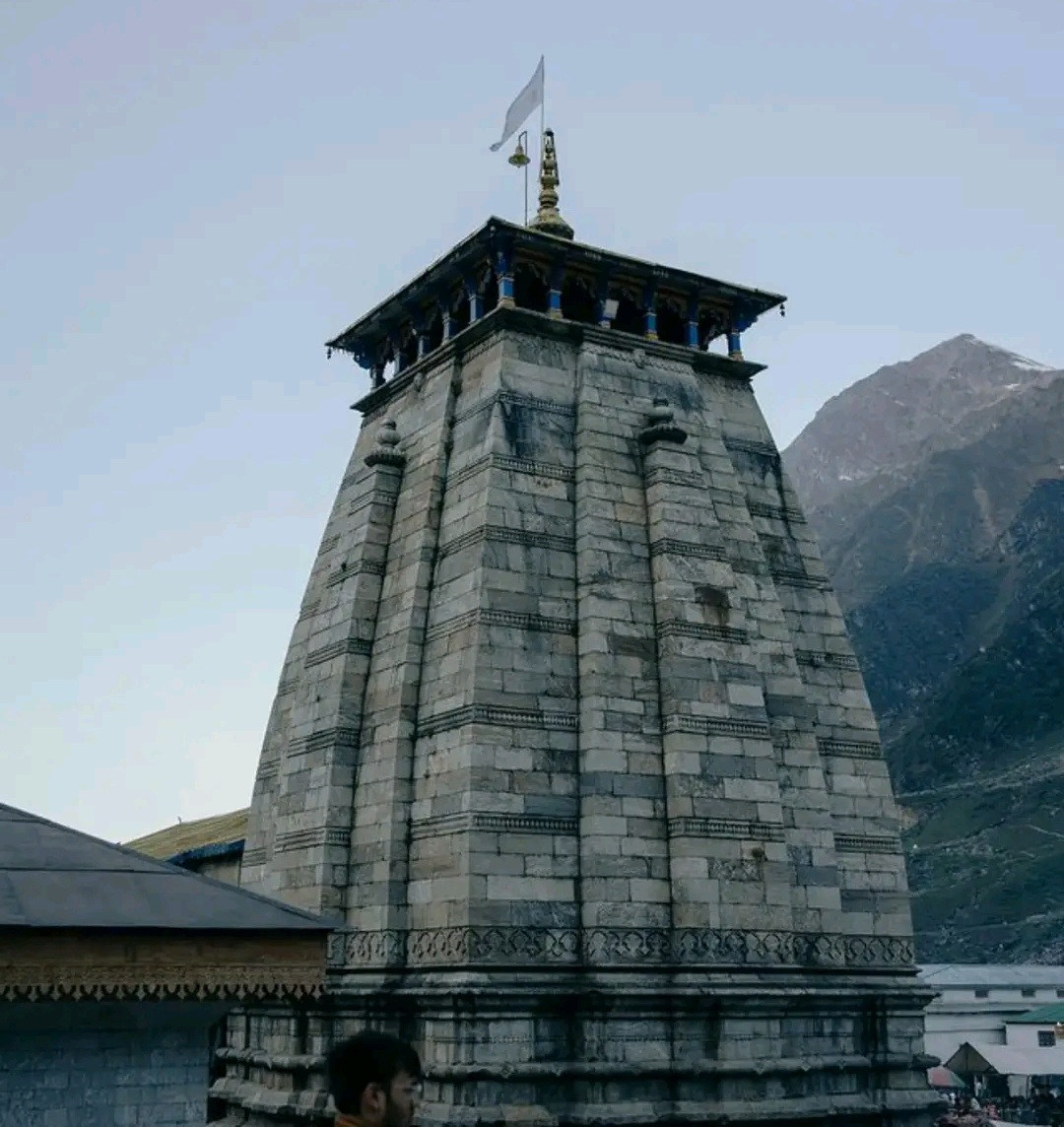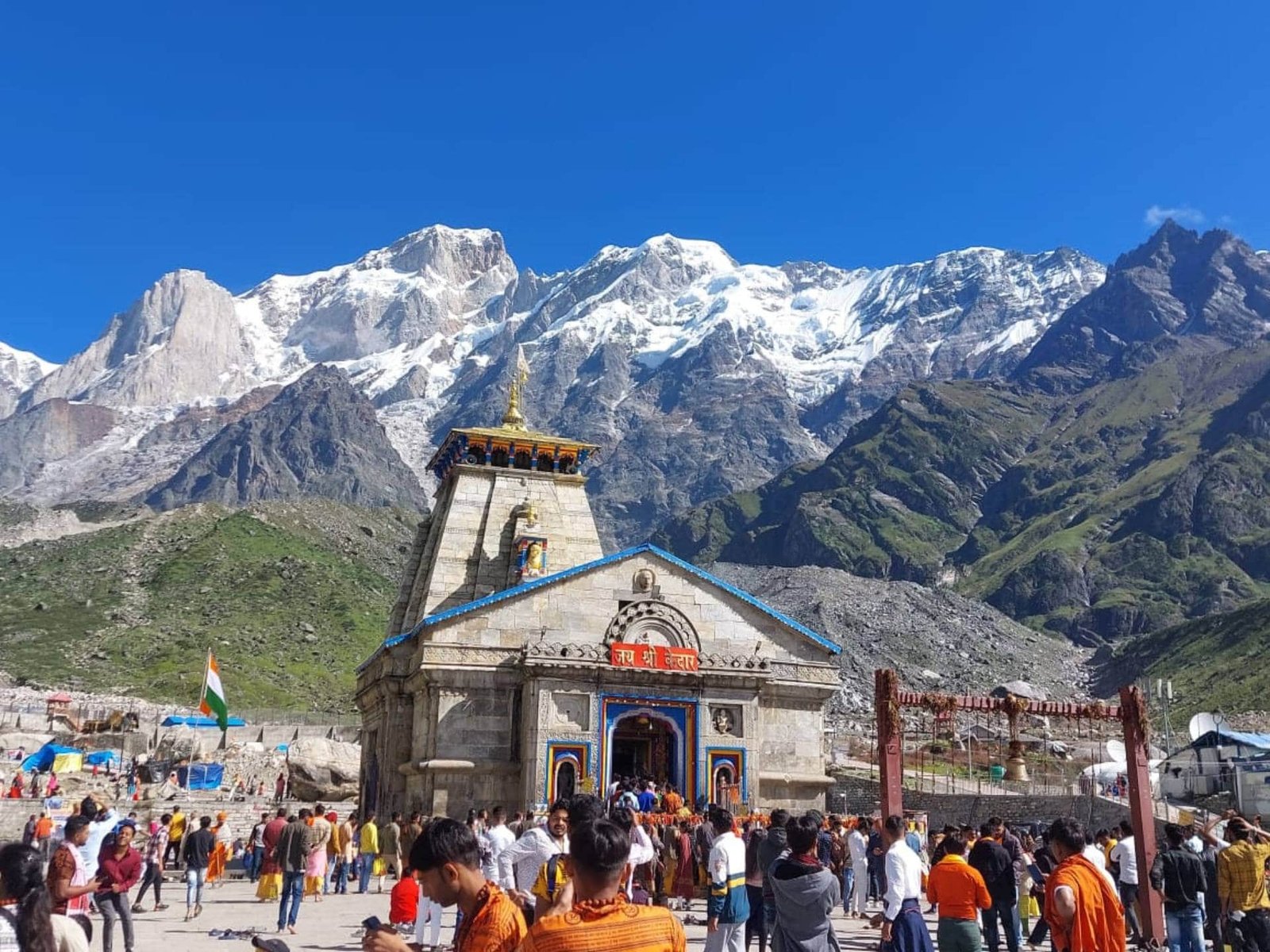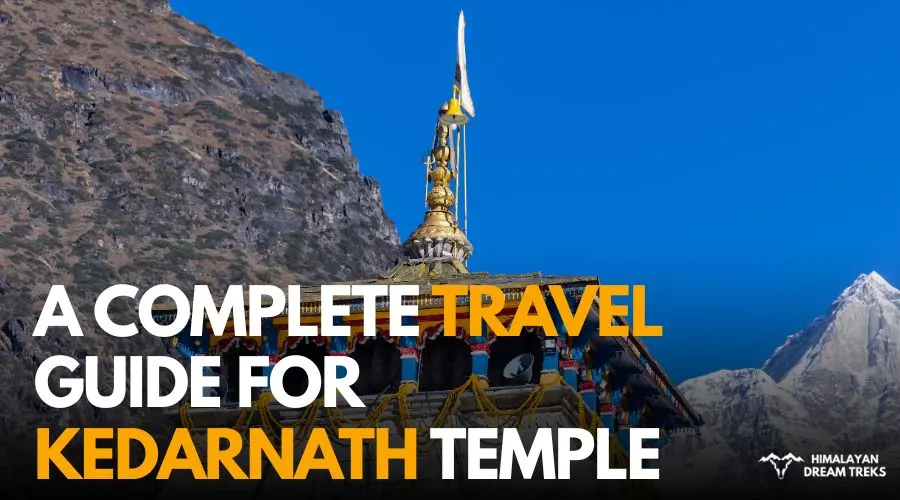There are few places in the world where spirituality and nature blend so beautifully that you feel like you’ve entered another realm. Kedarnath, situated in the lap of the Garhwal Himalayas in Uttarakhand, is one such destination.
Imagine standing at 11,755 feet above sea level, the chilly mountain breeze brushing your face, snow-clad peaks rising around you, and the ancient Kedarnath Temple in front of you, silently witnessing centuries of devotion and history.
Whether you’re a spiritual seeker, a traveler chasing mountain magic, or someone looking to discover India’s rich heritage, Kedarnath promises a journey like no other.
Table of Contents
The Legend of Kedarnath
The story of Kedarnath is deeply rooted in the Mahabharata. After the great Kurukshetra war, the Pandavas were burdened with guilt. They sought Lord Shiva to forgive them. But Shiva, not ready to forgive so easily, disguised himself as a bull and fled to the Garhwal region.
The Pandavas chased him. At Kedarnath, Shiva dived into the ground, leaving only his hump visible. This hump is what devotees worship at Kedarnath. Other parts of his body appeared in different places: arms in Tungnath, navel in Madmaheshwar, face in Rudranath, and hair in Kalpeshwar– together forming the Panch Kedar.

Kedarnath literally means Lord of field, and many strong legends are associated with the temple. With faith in Lord Shiva people believe in all the legends and with each legend the spiritual clarification of the devotees become more strong and deep. According to legend, Nara and Narayana, two incarnations of Vishnu, performed severe penance in front of an earthen Shivalingam in Badrikashram, Bharat Khand.
Lord Shiva appeared in front of them, pleased with their devotion, and invited them to request a boon. Nar and Narayan requested that Shiva take up permanent residence as a Jyotirlingam at Kedarnath, thereby relieving the suffering of all those who worship Shiva. Lord Shiva agreed, and it is said that Lord Shiva’s presence can still be felt in Kedarnath’s air today.
The second legend says that during the time when the five Pandavas brothers were asked to seek Shiva’s forgiveness for killing their cousins, the location was created. Lord Shiva, unwilling to give the Pandavas Darshans, sent himself to Kashi in the form of a bull to live incognito in Guptkashi, where he was eventually discovered by the Pandavas and finally forgave them and ushered with his blessings.
Another popular legend associated with Kedar Temple is that Goddess Parvati worshipped Kedareshwar in order to become Ardhanarishvara, the union of Shiva and Parvati.
Kedarnath at a Glance
| Feature | Details |
| Location | Rudraprayag district, Uttarakhand |
| Altitude | 3,583 meters (11,755 ft) |
| Dedicated to | Lord Shiva (as the “Kedarnath” form) |
| Open for pilgrims | April/May to November (weather-based) |
| Trek length | 16 km from Gaurikund |
| Jyotirlinga | One of the 12 sacred Jyotirlingas |
| Char Dham Yatra | One of the four sites |
The Temple’s Architecture-Timeless and Tough
When you first lay eyes on Kedarnath Temple, it’s not grand in a glittering way but it’s majestic in its simplicity. Built from massive grey stone slabs, this 8th-century temple stands strong without cement or mortar.

What’s even more impressive is that it has survived countless natural disasters, including the horrific 2013 floods. A mysterious boulder (now called Bhim Shila) diverted the deadly waters and shielded the temple from destruction.
Some call it a coincidence. Others call it divine protection.
How to Reach Kedarnath: Step-by-Step Guide
Reaching Kedarnath isn’t easy, but that’s what makes it special. The journey itself is a part of the pilgrimage.
Step 1: Reach Haridwar/Rishikesh
These are your main starting points, well-connected by road, rail, and air.
Step 2: Travel to Gaurikund
From Haridwar or Rishikesh, you can take a taxi or a bus to Gaurikund. This is the last point for vehicles. The road passes through scenic towns like Devprayag, Rudraprayag, and Guptkashi.
Step 3: Trek from Gaurikund to Kedarnath
From Gaurikund, it’s a 16 km uphill trek to Kedarnath. The path is steep and tiring but filled with chants of “Har Har Mahadev!”, tea stalls, resting points, and breathtaking views.
If you’re not up for trekking, you can opt for:
- Pony rides
- Palki (palanquin)
- Helicopter services (advance booking is a must)
Best Time to Visit Kedarnath
Kedarnath opens for only 6-7 months a year, usually from April/May to November, depending on the weather.
Seasonal Overview:
| Season | Months | Weather & Highlights |
| Summer | May – June | Best time to visit,clear skies, mild cold |
| Monsoon | July – August | Risk of landslides,not recommended |
| Autumn | Sep – Oct | Cool and pleasant, post-monsoon freshness |
| Winter | Nov – Apr | Closed |
Where to Stay – Accommodation Options
You won’t find luxury hotels here, but you’ll find cozy stays with warm hearts. Most accommodations in Kedarnath are basic, budget-friendly, and meant for pilgrims who prioritize experience over luxury.
Stay Options in Kedarnath (Budget-Friendly)
- GMVN Kedarnath Camp (Tents and Dormitories)
Managed by the Uttarakhand government, this is one of the most economical and reliable options. The tents and dormitories are basic but clean. You’ll get blankets, drinking water, and common washrooms. Perfect for solo travelers and groups.
Approx. cost: ₹300 – ₹500 per night
- Punjab & Sindh Awas
This dharamshala is ideal for pilgrims traveling with family. The rooms are simple but well-maintained, and there’s an in-house canteen that serves hot vegetarian meals. Many travelers love the quiet here after a hectic day.
Approx. cost: ₹400 – ₹800 per night
- Jaipur House
A guest house that offers decently spacious rooms with good ventilation and basic amenities. It’s not very far from the main temple, making it convenient for morning darshan. The view of the valley is a pleasant bonus. Approx. cost: ₹700 – ₹1,200 per night
- Bikaner House
A budget lodge that’s popular for its proximity to the Kedarnath Temple. You’ll find basic double rooms with attached bathrooms and hot water arrangements. It’s a peaceful stay with friendly hosts.
Approx. cost: ₹600 – ₹1,000 per night
Note: Prices may vary depending on the season. Most bookings are done offline or via local contacts, though some are listed on Uttarakhand Tourism or Yatra portals.
Tips for Booking:
- Book in advance, especially during May–June and September–October.
- Carry cash, as digital payments may not always work.
- Consider staying at Guptkashi or Sonprayag if you want better amenities and plan to visit the temple early in the morning via pony or helicopter.
What to Pack – Essentials for Kedarnath Trip
Here’s a quick checklist to help you pack smart:
- Warm jackets and woolens (temperatures drop fast)
- Waterproof shoes with good grip
- Raincoat/Umbrella (weather changes often)
- Sunscreen, lip balm, sunglasses
- Torchlight and extra batteries
- First aid kit and personal medicines
- ID proof and extra passport photos
- Energy bars, glucose, and snacks
Places to Visit Near Kedarnath
If you have time, explore these spiritual and scenic sites nearby:
- Bhairavnath Temple: Protector of Kedarnath, just a short trek away.
- Vasuki Tal: A glacial lake surrounded by snowy peaks.
- Triyuginarayan Temple: The wedding place of Lord Shiva and Parvati.
- Gaurikund: Named after Goddess Parvati, it has hot water springs.
- Chorabari Tal (Gandhi Sarovar): A serene glacial lake for trekkers.
Helicopter Yatra to Kedarnath- A Comfortable Option
If you’re traveling with elderly family members or want to skip the steep 16 km trek from Gaurikund to Kedarnath, the helicopter yatra is a convenient and time-saving alternative. Daily helicopter services operate from Guptkashi, Phata, and Sirsi directly to the Kedarnath helipad, which is just a 500-meter walk from the temple. The aerial journey offers breathtaking views of the snow-capped Himalayas and takes barely 8–10 minutes each way.
Bookings can be made online through the official Uttarakhand government website heliservices.uk.gov.in or via IRCTC’s portal during the Char Dham Yatra season. It’s best to book in advance, as slots fill up quickly, especially during peak pilgrimage months. Don’t forget to carry a valid ID proof and the medical fitness certificate if you’re over 60. Round-trip tickets usually cost between ₹4,500 – ₹7,000 per person, depending on the operator and location.
Pro tip: Try booking early morning slots for better chances of smooth flying and minimal weather disruptions.
Health & Safety Tips
- Acclimatize: Spend a day in Guptkashi or Sonprayag before trekking.
- Stay Hydrated: But avoid drinking untreated water.
- Go slow: Don’t rush. Take breaks during the climb.
- Listen to your body: If you feel dizzy or breathless, rest or seek help.
- Travel in groups: Especially if you’re not taking a guide.
Lesser-Known Facts about Kedarnath
- The temple’s deity is shifted to Ukhimath in winter.
- No cement was used in building the temple.
- Bhim Shila, the boulder that saved the temple in 2013, is now worshipped too.
- Electricity came to Kedarnath only recently.
FAQs
What is the best time to visit Kedarnath Temple? The ideal time is May to June and September to October, when the weather is pleasant and the trek is safer.
Can beginners do the Kedarnath trek? Yes, but it’s a challenging trek. Prepare with basic fitness, carry essentials, and take breaks.
Are mobile networks available in Kedarnath? Only BSNL and Jio offer limited connectivity. Don’t rely on mobile data here.

Leave a Comment